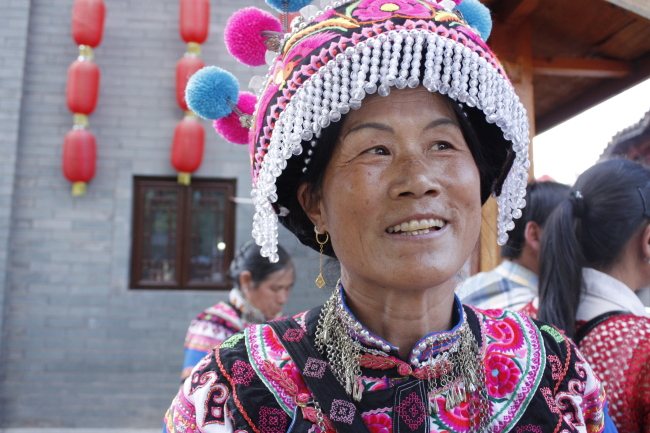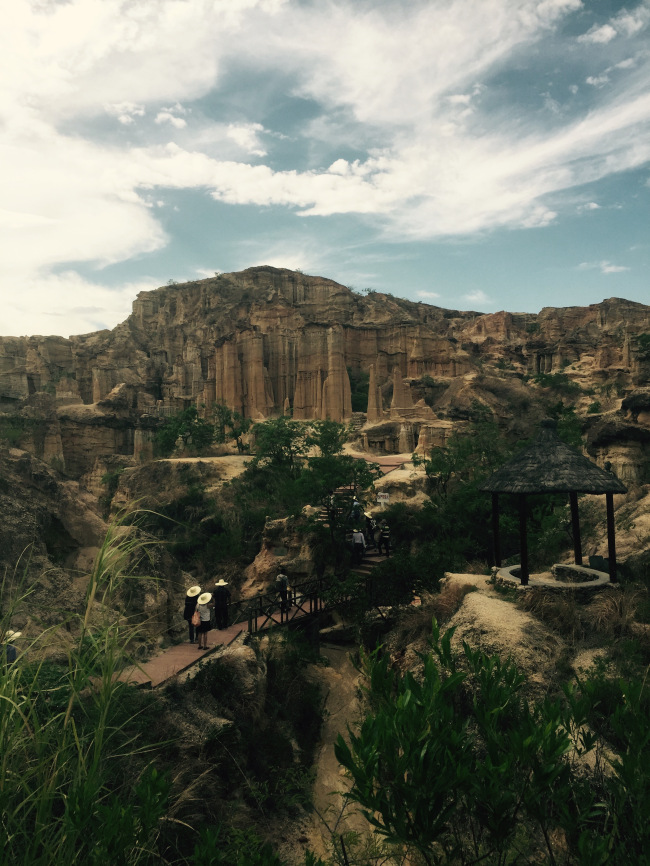China’s Yunnan offers cultural diversity, spectacular natural scenery
By 줄리 잭슨 (Julie Jackson)Published : Oct. 2, 2015 - 14:15

YUNNAN PROVINCE, China -- While it may not be home to the Forbidden City or the Oriental Pearl Tower, China’s southwest province of Yunnan is where one can get a glimpse of one of the most unique and culturally rich sides of the country.
The location of Yunnan, which means “the place of the colorful clouds in the south” in Chinese, contributes to its rich culture and exquisite scenery. Bordering Vietnam, Laos and Myanmar, the province has served as China’s main bridge to Southeast Asia and home to a large number of ethnic minorities in China.
Among many counties in Yunnan, Yuanmou is relatively unknown to most Koreans. The area is best known for tulin, which literally means “earth forest” composed of earth columns or pillars that rise up like a giant forest. The unique and mysterious landscape, formed by soil erosion 1-2 million years ago, somewhat resembles that of Turkey’s Cappadocia.
From a distance, the “forest” looks like a giant, abandoned castle, covered with countless years of dust. As reflected in its natural landscape, the county indeed boasts a long history. It is where the fossilized remains of the “Yuanmou Man,” a member of the Homo genus who lived 1.7 million years ago, was found in 1965.
Yuanmou’s tulin certainly offer one of the most unforgettable experiences while staying in Yunnan, even if it means having to walk under the scorching summer sun. In June, the weather in Yuanmou can be as hot as over 40 degrees Celsius.
But even without tulin, Yuanmou boasts beautiful rural scenery with red soil, dramatic clouds and endless agricultural farms and fields. The county is particularly known for its sun-dried cherry tomatoes, which taste almost like sweeter versions of raisins.

On the cultural side of Yunnan, Chuxiong Yi Autonomous Prefecture is recommended. Located in the north-central part of Yunnan province, the prefecture is the residential area of the Yi People -- the largest ethnic minority group in the region. They are known for their practice of a form of animism with elements of Buddhism and Taoism, as well as powerful traditional practices, such as rituals for cursing enemies, exorcism and healing.
Visitors are welcomed by the Yis in their colorful, exquisite costumes, who often dance and sing their traditional tunes in public.
“I’m very proud of my heritage,” said an elderly Yi woman who was dancing to traditional music in the streets. She was wearing a traditional Yi costume -- an embroidered jacket and long skirts hemmed with multiple layers -- which she made herself.
“Dancing makes me very happy. It’s what I’ve been doing since I was a little kid. It reminds us of our traditions and values.”
On top of cultural performances by the Yis, visitors should not miss out on dining out in Chuxiong. Most restaurants run by the Yi people treat their guests with wine according to their traditional eating customs. The Yis usually pour the wine in a big bowl first, while everyone is sitting down in a circle. The oldest of the group will take the first sip, and pass the bowl to the next person after wiping its edge. They repeat the process until the bowl becomes empty.
While dining out, visitors can also experience the Yis’ tradition named “Tiaocai.” While sitting down on the table after all the dishes are ready, they visit each and every table in the restaurant and sing loudly for the guests, using drums and other traditional instruments while jumping and dancing. In some restaurants, the Yis reportedly do their “Tiaocai” while carrying food plates on the head.
“We encourage the Yi people to carry on and celebrate their traditions,” said an officer from the Information Office of Yunnan Authority. “We appreciate their existence in Yunnan.”
By Claire Lee (dyc@heraldcorp.com)



![[Exclusive] Korean military set to ban iPhones over 'security' concerns](http://res.heraldm.com/phpwas/restmb_idxmake.php?idx=644&simg=/content/image/2024/04/23/20240423050599_0.jpg&u=20240423183955)




![[Herald Interview] 'Amid aging population, Korea to invite more young professionals from overseas'](http://res.heraldm.com/phpwas/restmb_idxmake.php?idx=644&simg=/content/image/2024/04/24/20240424050844_0.jpg&u=20240424200058)

![[Pressure points] Leggings in public: Fashion statement or social faux pas?](http://res.heraldm.com/phpwas/restmb_idxmake.php?idx=644&simg=/content/image/2024/04/23/20240423050669_0.jpg&u=)








